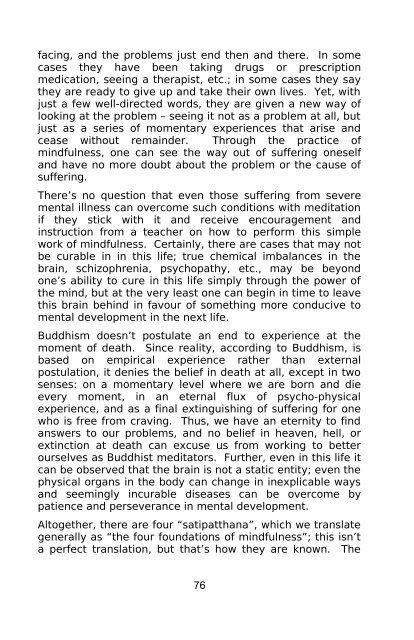Lessons In Practical Buddhism - Sirimangalo.Org
Lessons In Practical Buddhism - Sirimangalo.Org
Lessons In Practical Buddhism - Sirimangalo.Org
Create successful ePaper yourself
Turn your PDF publications into a flip-book with our unique Google optimized e-Paper software.
facing, and the problems just end then and there. <strong>In</strong> some<br />
cases they have been taking drugs or prescription<br />
medication, seeing a therapist, etc.; in some cases they say<br />
they are ready to give up and take their own lives. Yet, with<br />
just a few well-directed words, they are given a new way of<br />
looking at the problem – seeing it not as a problem at all, but<br />
just as a series of momentary experiences that arise and<br />
cease without remainder. Through the practice of<br />
mindfulness, one can see the way out of suffering oneself<br />
and have no more doubt about the problem or the cause of<br />
suffering.<br />
There’s no question that even those suffering from severe<br />
mental illness can overcome such conditions with meditation<br />
if they stick with it and receive encouragement and<br />
instruction from a teacher on how to perform this simple<br />
work of mindfulness. Certainly, there are cases that may not<br />
be curable in in this life; true chemical imbalances in the<br />
brain, schizophrenia, psychopathy, etc., may be beyond<br />
one’s ability to cure in this life simply through the power of<br />
the mind, but at the very least one can begin in time to leave<br />
this brain behind in favour of something more conducive to<br />
mental development in the next life.<br />
<strong>Buddhism</strong> doesn’t postulate an end to experience at the<br />
moment of death. Since reality, according to <strong>Buddhism</strong>, is<br />
based on empirical experience rather than external<br />
postulation, it denies the belief in death at all, except in two<br />
senses: on a momentary level where we are born and die<br />
every moment, in an eternal flux of psycho-physical<br />
experience, and as a final extinguishing of suffering for one<br />
who is free from craving. Thus, we have an eternity to find<br />
answers to our problems, and no belief in heaven, hell, or<br />
extinction at death can excuse us from working to better<br />
ourselves as Buddhist meditators. Further, even in this life it<br />
can be observed that the brain is not a static entity; even the<br />
physical organs in the body can change in inexplicable ways<br />
and seemingly incurable diseases can be overcome by<br />
patience and perseverance in mental development.<br />
Altogether, there are four “satipatthana”, which we translate<br />
generally as “the four foundations of mindfulness”; this isn’t<br />
a perfect translation, but that’s how they are known. The<br />
76












